
Choose the Right Search Engine Optimisation Company for Your Business

Overview
Selecting the right search engine optimisation (SEO) company for your business requires careful evaluation of their expertise, service offerings, and how well they align with your specific goals. Understanding the fundamentals of SEO is crucial. Start by defining clear objectives for your online presence.
Next, review case studies and testimonials to gauge the company's effectiveness. Are there proven results that demonstrate their capability? Furthermore, ensure you are informed about pricing structures and contract terms. This knowledge is vital to fostering a successful partnership that enhances your online visibility.
In conclusion, by following these guidelines, you can make a more informed decision that will ultimately benefit your business's online strategy.
Introduction
Choosing the right search engine optimisation (SEO) company can significantly influence a business's online success, especially in an era where digital visibility is paramount. With nearly 89% of companies investing in SEO services, understanding the fundamentals of SEO—from keyword research to technical optimisation—is essential for making an informed decision.
However, as businesses strive to enhance their online presence, the challenge lies in navigating a crowded market of SEO providers, each claiming to deliver results. What criteria should be prioritised to ensure alignment with specific business goals and to foster a fruitful partnership? By focusing on these key factors, businesses can make informed choices that lead to successful collaborations.
Understand the Basics of Search Engine Optimization
Search Engine Optimisation (SEO) is essential for enhancing your website's visibility on search engines like Google. Key components include:
-
Keyword Research: This is the foundation of effective SEO. Identifying the terms potential customers use to search for your services is crucial. In 2025, 46% of all Google searches have regional intent, highlighting the need for targeted keyword strategies that connect with nearby audiences. As noted by WordStream, effective keyword research is not just a task but a strategic approach that can significantly impact your online visibility and success.
-
On-Page SEO: This involves optimising individual pages to rank higher. Successful strategies include refining title tags, crafting compelling meta descriptions, and ensuring high-quality content. Case studies indicate that companies adopting strong on-page SEO strategies observe substantial enhancements in their search rankings. For instance, a DUI law firm in Austin achieved top local search positions after enhancing their on-page elements, demonstrating the direct impact of these strategies on visibility.
-
Off-Page SEO: Building backlinks and improving your site's authority through external sources is vital. Research indicates that the number of domains linking to a page correlates highly with Google rankings, making link-building a critical aspect of your SEO strategy.
-
Technical SEO: Ensuring your website is crawlable and indexable by search engines is fundamental. This includes optimising site speed, ensuring mobile-friendliness, and implementing structured data. In 2025, companies that emphasise technical SEO can anticipate enhanced user engagement and increased conversion rates.
Grasping these fundamentals will enable you to assess a search engine optimisation company effectively. As of 2025, 89% of companies are investing in a search engine optimisation company, recognising its importance in driving traffic and generating leads. Experts emphasise that effective keyword research is not just a task but a strategic approach that can significantly impact your online visibility and success.
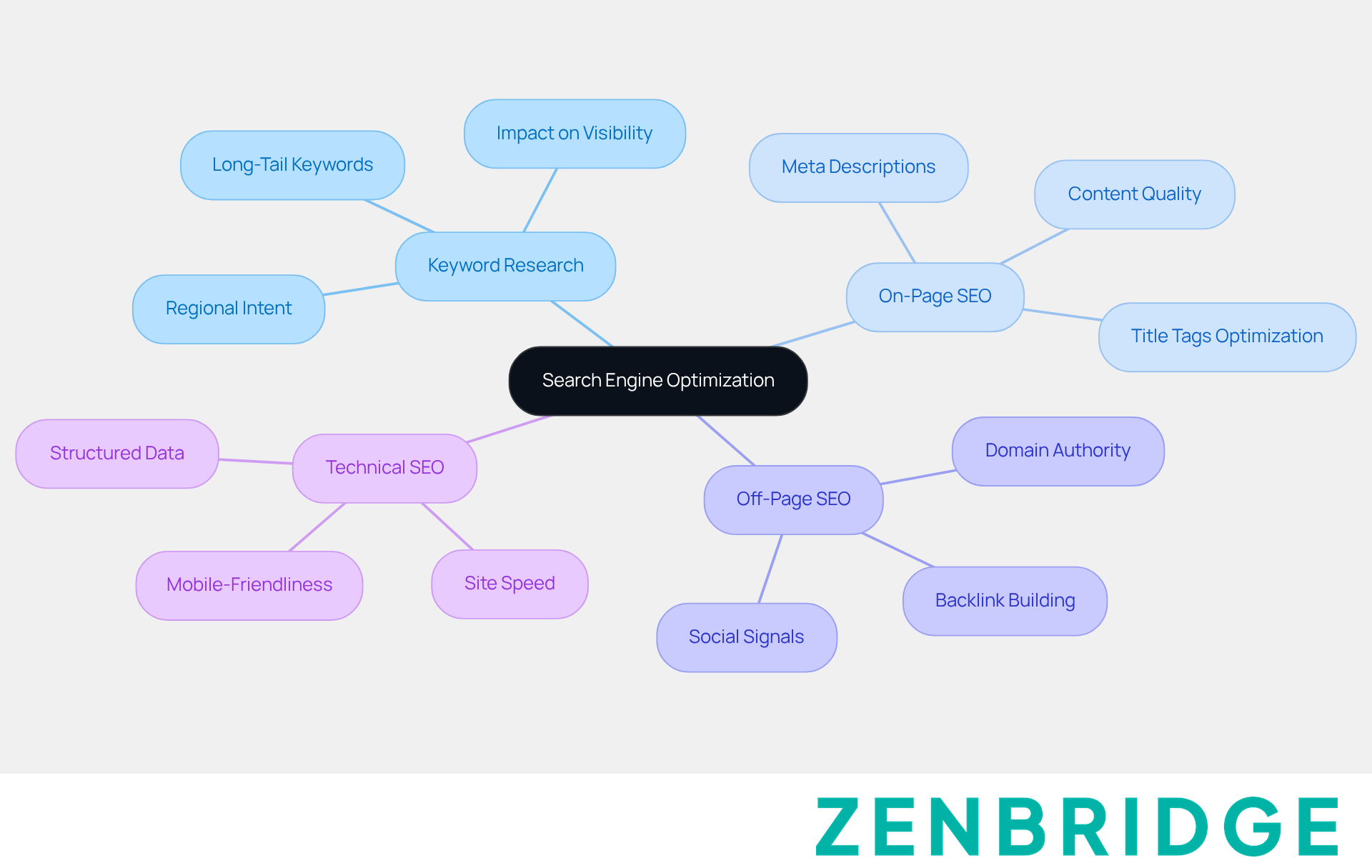
Define Your SEO Goals and Requirements
Before you begin your search for a search engine optimisation company, it is crucial to define your goals. Consider the following points:
- Traffic Goals: Are you looking to increase organic traffic by a specific percentage? Research shows that companies employing effective SEO strategies can see an average increase of 53% in organic traffic within six months. This underscores the importance of establishing clear traffic objectives.
- Conversion Goals: Is your focus on generating more leads or sales from your website? Marketers stress that setting measurable conversion goals is vital for tracking success. As Eli Adams notes, "Organic traffic will be a game-changer for businesses in 2025."
- Brand Awareness: Are you aiming to enhance your brand's visibility in local searches? With 46% of Google searches having regional intent, improving your regional SEO can significantly impact your brand's reach.
- Specific Services: Identify whether you need help with regional SEO, content creation, technical SEO, or a combination of these services. Tailoring your requirements will facilitate better communication with potential SEO partners and align your services with your goals.
Documenting these goals not only clarifies your vision but also enables you to engage more effectively with a search engine optimisation company, ensuring alignment with your objectives. For example, a successful case study in community SEO can demonstrate how defined goals led to improved outcomes, reinforcing the value of a strategic approach.
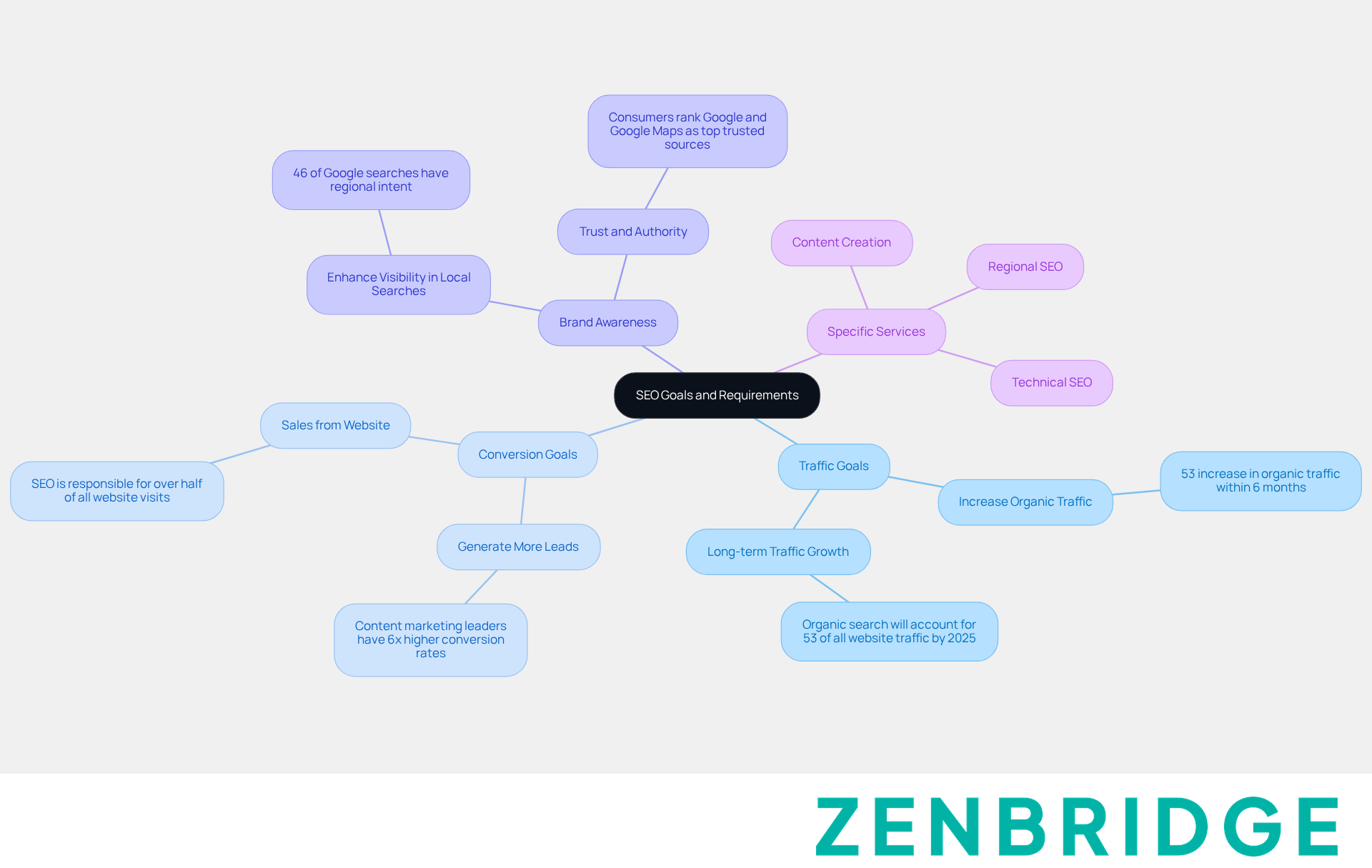
Evaluate SEO Companies Based on Expertise and Services
When selecting an SEO company, it is crucial to evaluate several key criteria to ensure you partner with a provider that aligns with your business needs:
-
Industry Experience: Prioritise companies that have a proven track record in your specific industry. This experience can significantly enhance their understanding of your market dynamics and customer behaviour, leading to more effective strategies. In fact, 46% of all Google searches have regional intent, highlighting the necessity for SEO firms to be skilled in regional SEO practises. Furthermore, 88% of consumers contact or visit a nearby establishment within 24 hours of searching for it online, underscoring the significance of regional SEO knowledge.
-
Service Offerings: Confirm that the organisation provides the specific services you require, such as local SEO, content marketing, or technical SEO. A comprehensive service offering is essential, as 67% of small businesses are already leveraging AI for content creation and SEO, indicating a trend towards integrated solutions from a search engine optimisation company. Moreover, 70% of marketers consider a search engine optimisation company to be one of the most effective sales channels, reinforcing the need for a broad range of services.
-
Certifications and Awards: Look for industry certifications or accolades that validate their expertise. Recognised certifications can serve as a benchmark for quality and reliability in their service delivery. Industry leaders note that having recognised certifications is crucial for establishing trust and credibility in the SEO space.
-
Tools and Technologies: Inquire about the tools they utilise for SEO analysis and reporting. Effective SEO depends on advanced technologies, and organisations that invest in the latest tools are likely to deliver superior results. Notably, 86% of SEO experts have integrated AI tools into their strategies, highlighting the importance of leveraging advanced technologies for effective SEO.
Developing a shortlist of organisations that meet these criteria will support a more informed decision-making process as you aim to enhance your online presence and drive local traffic.
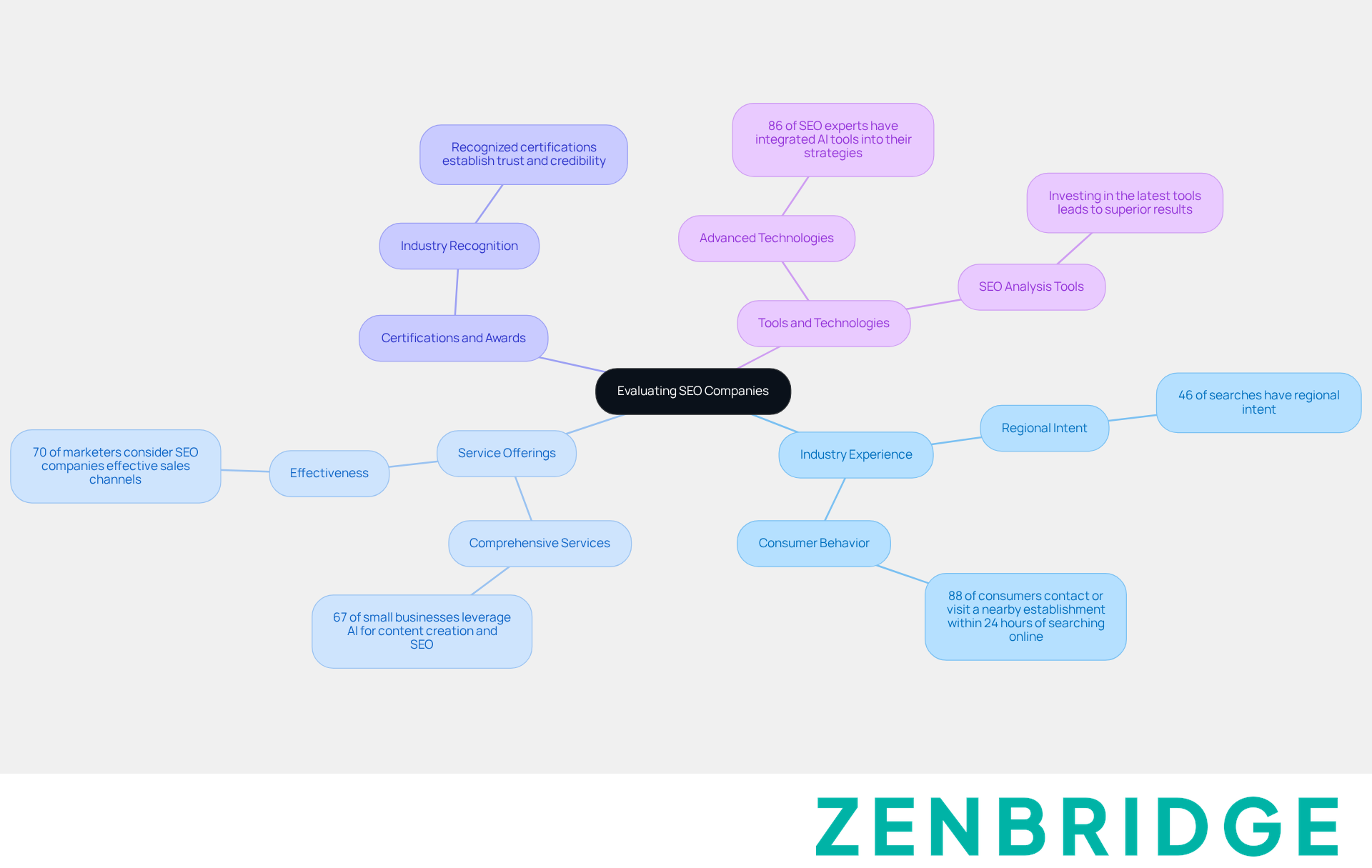
Review Case Studies and Client Testimonials
To effectively evaluate a search engine optimisation company, it is crucial to examine their case studies and client testimonials.
-
Case Studies: Seek detailed examples of previous projects that outline the challenges faced, strategies employed, and results achieved. For instance, companies that adopted strategic SEO methods often report substantial increases in traffic, with some case studies indicating an average traffic boost of over 126% for those ranking in the Google 3-pack. Furthermore, companies that operate a blog obtain 97% more backlinks, which can greatly improve their SEO performance. This insight reveals the organisation's problem-solving capabilities and their ability to deliver measurable results.
-
Client Testimonials: Analyse reviews from past clients to gauge their experiences. Look for feedback that highlights aspects such as communication, transparency, and the effectiveness of the strategies employed. Positive testimonials often indicate a firm's dedication to client success, with 91% of consumers more likely to engage with establishments that actively respond to reviews, and 89% of consumers are more likely to select an organisation that replies to all reviews.
-
Success Metrics: Pay attention to key performance indicators like increased website traffic, improved search rankings, and higher conversion rates. For example, SEO drives over 1,000% more traffic than organic social media, emphasising the effectiveness of SEO in driving traffic compared to other marketing strategies. Comprehending these metrics will assist you in evaluating the organisation's influence on your enterprise.
By focusing on these elements, you can make a more informed decision when selecting a search engine optimisation company that aligns with your business goals.
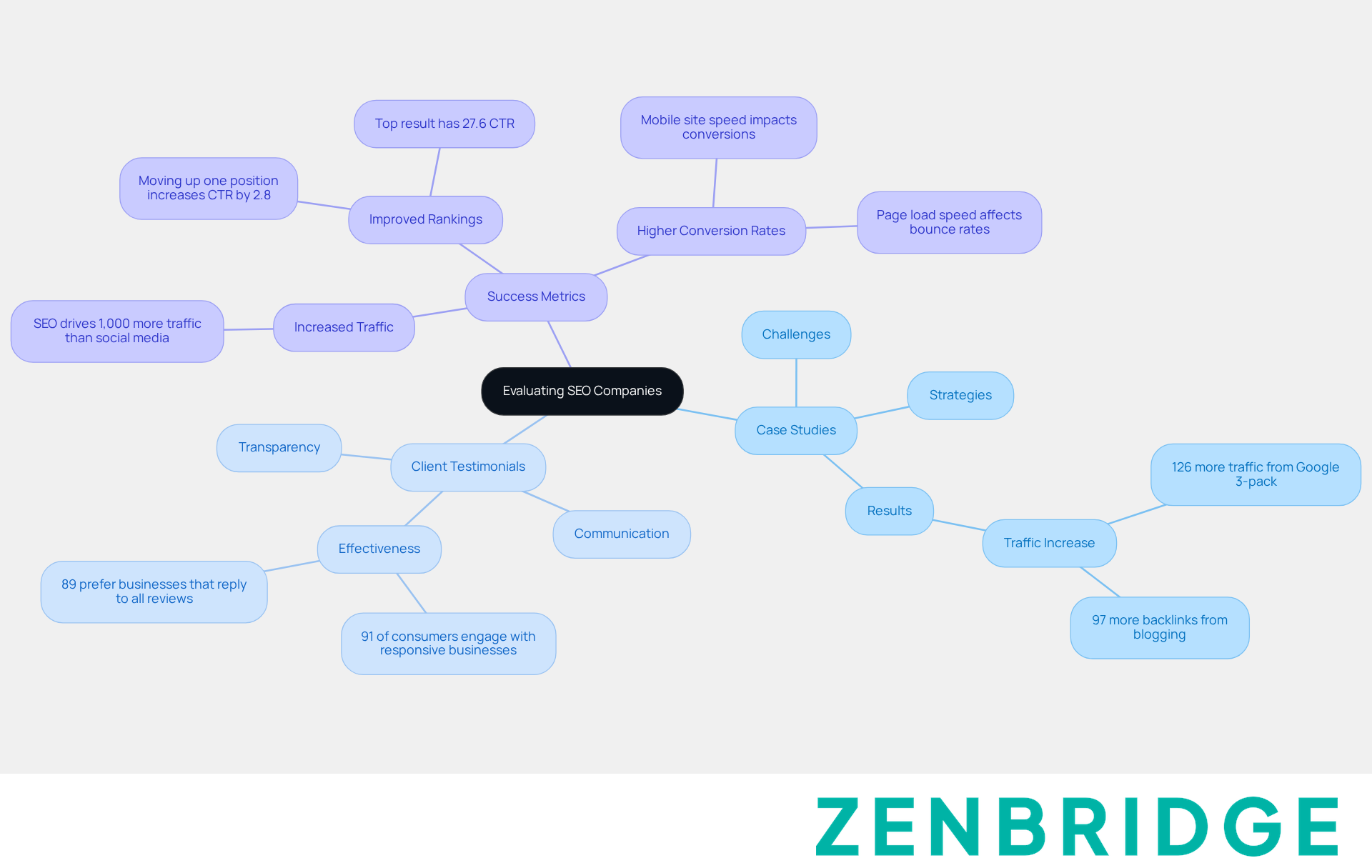
Understand Pricing Structures and Contract Terms
When engaging with prospective search engine optimisation company firms, it’s crucial to understand the various pricing structures that are available. These typically include:
- Hourly rates
- Monthly retainers
- Project-based fees
Each model has its advantages, making it essential to select one that aligns with your budget and specific needs.
For example, monthly retainers are the most common, with 78% of agencies utilising this approach, often costing between $500 and $5,000 per month. In the United States, SEO costs can range from $2,500 to $10,000 per month, depending on the complexity of the required services.
Additionally, ensure that the pricing reflects the scope of services you need. Be cautious of a search engine optimisation company offering significantly lower prices, as this might indicate subpar quality or ineffective practises. A successful search engine optimisation company often implements a comprehensive package that includes foundational SEO, technical optimisation, and content creation. As Chris Raulf emphasises, a tailored SEO package is worth the investment in the long run.
It’s also vital to review contract terms meticulously. SEO service contracts typically last from six months to a year, so pay close attention to the duration, cancellation policies, and any potential additional fees. Understanding these elements will help you avoid pitfalls and ensure a successful partnership. As Scott Langdon aptly puts it, "SEO is an ongoing process of improving your website’s ability to rank prominently for relevant queries in search engines like Google." Being well-informed about pricing and contract terms will empower you to make decisions that foster a fruitful collaboration.
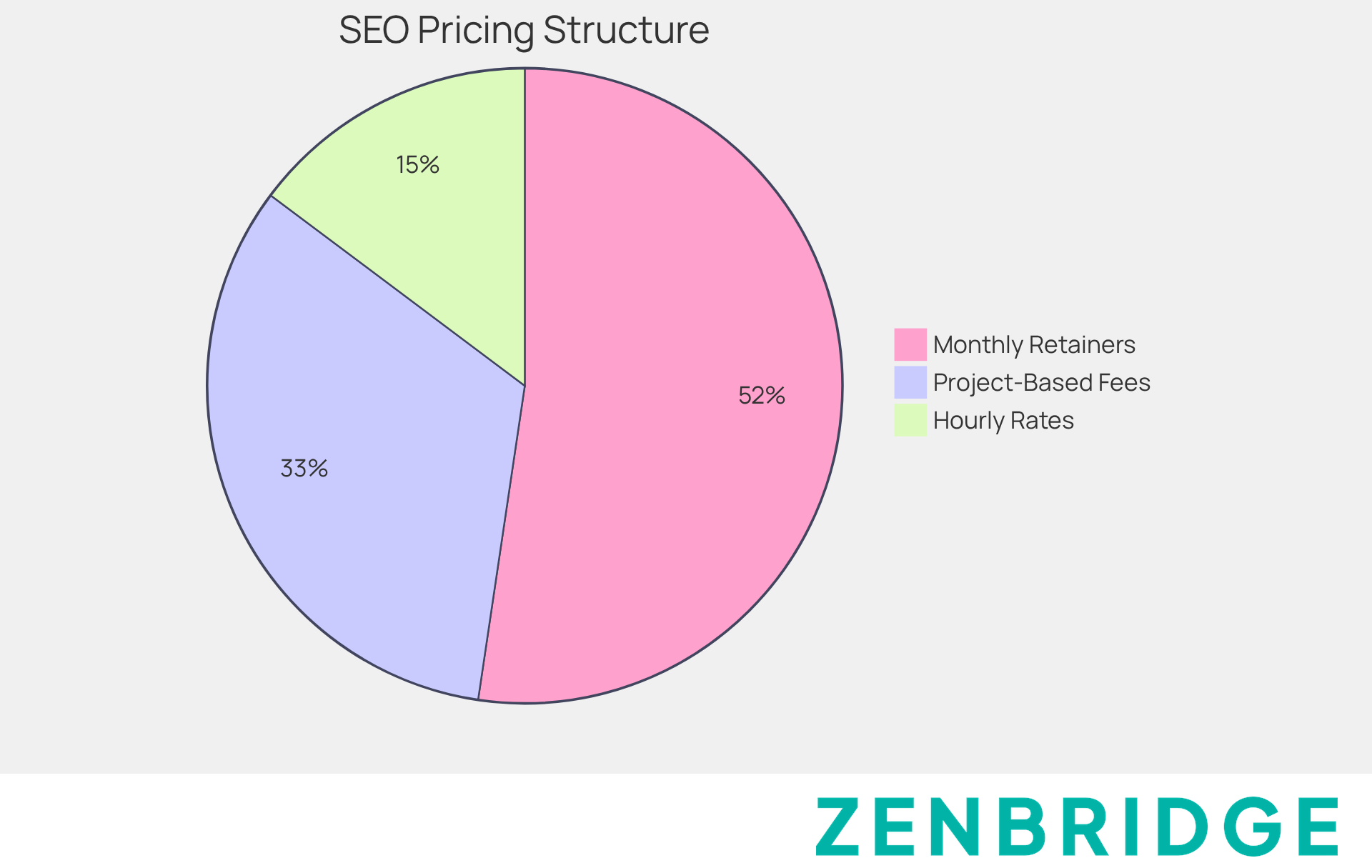
Conclusion
Choosing the right search engine optimisation (SEO) company is a critical decision that can significantly influence a business's online visibility and success. Understanding the foundational elements of SEO—such as keyword research, on-page and off-page strategies, and technical optimisation—enables businesses to better assess potential partners. Furthermore, defining clear SEO goals and requirements is essential; this alignment of expectations facilitates effective communication with service providers.
Key considerations when selecting an SEO company include:
- Evaluating their industry experience
- Reviewing service offerings
- Checking certifications
- Understanding the tools they use
Reviewing case studies and client testimonials can provide valuable insights into a company's effectiveness and reliability. In addition, understanding pricing structures and contract terms ensures that businesses make informed financial commitments while avoiding potential pitfalls.
Ultimately, investing time and effort into selecting the right SEO partner can yield substantial returns. This investment drives organic traffic, enhances brand awareness, and improves conversion rates. As businesses navigate the competitive digital landscape, prioritising SEO is not just beneficial—it's essential for long-term growth and success. Taking the time to choose wisely empowers businesses to harness the full potential of SEO, ensuring they stand out in an ever-evolving marketplace.
Frequently Asked Questions
What is Search Engine Optimisation (SEO)?
SEO is the practise of enhancing a website's visibility on search engines like Google through various strategies, including keyword research, on-page SEO, off-page SEO, and technical SEO.
Why is keyword research important in SEO?
Keyword research is crucial because it helps identify the terms potential customers use to search for services, enabling targeted strategies that connect with nearby audiences. It significantly impacts online visibility and success.
What are the key components of on-page SEO?
Key components of on-page SEO include optimising title tags, crafting compelling meta descriptions, and ensuring high-quality content. These strategies can lead to substantial enhancements in search rankings.
How does off-page SEO contribute to a website's authority?
Off-page SEO involves building backlinks and improving a site's authority through external sources. Research shows that the number of domains linking to a page correlates highly with Google rankings.
What is the role of technical SEO?
Technical SEO ensures that a website is crawlable and indexable by search engines. This includes optimising site speed, ensuring mobile-friendliness, and implementing structured data, which can enhance user engagement and conversion rates.
What should businesses consider when defining their SEO goals?
Businesses should consider traffic goals (like increasing organic traffic), conversion goals (generating more leads or sales), brand awareness (enhancing visibility in local searches), and specific services needed (regional SEO, content creation, etc.).
How can businesses benefit from documenting their SEO goals?
Documenting SEO goals clarifies a business's vision and enables effective engagement with a search engine optimisation company, ensuring that the services align with their objectives.
What is the significance of regional intent in SEO?
With 46% of Google searches having regional intent, focusing on regional SEO can significantly impact a brand's reach and visibility in local searches.

